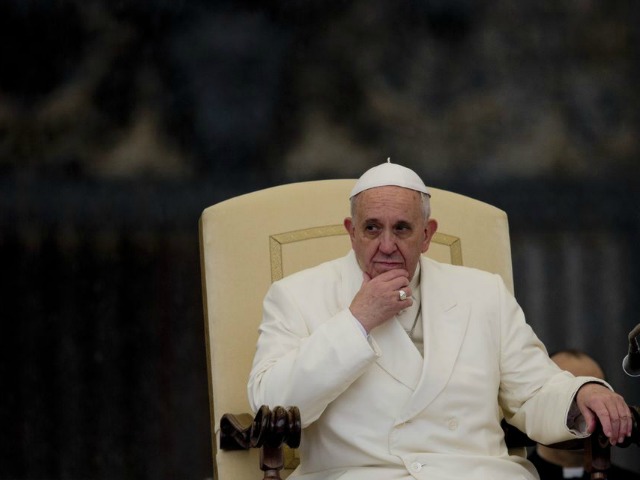
The Telegraph reports that a divorced and remarried Argentine woman states Pope Francis telephoned her at home and told her she “is not doing anything wrong” if she receives communion.
According to the report, Argentinian Jacqui Lisbona wrote to the pontiff six months ago, saying she was distressed that, as a Catholic who had divorced over 20 years ago and then remarried in a civil ceremony, she was not permitted by Catholic doctrine to receive Holy Communion.
Lisbona, who reports she has been happily married to her current husband for 19 years and has two teenage daughters, said she was concerned she would be “violating Church rules” if she received communion.
Pope Francis, who has a reputation of spontaneously phoning ordinary people in response to their letters, reportedly called Lisbona at her home in Santa Fe the day after Easter.
“A divorcee who takes communion is not doing anything wrong,” Lisbona said the pope told her.
According to the teachings of the Church, while divorced Catholics who were married in the Church may be able to receive communion, those who remarry without an annulment cannot receive communion because they are living in a state of sin and adultery.
The Telegraph reports that, in response to requests for confirmation of the pope’s words, the Vatican responded, “We would neither confirm nor deny that – this was a private telephone call made by the Holy Father and we would not divulge the details.”
Julio Sabetta, Lisbona’s husband, said he first answered the phone call from Pope Francis. On his Facebook page, Sabetta wrote, “One of the most wonderful things in my life has just happened – receiving a telephone call from none other than Papa Francesco.”
“We’re Catholics, we believe in God, and though we don’t go to Mass every Sunday, every evening we thank the Lord for our family and our work,” said Sabetta, who is a pastry chef.
Sabetta said Pope Francis introduced himself on the phone as “Father Bergoglio,” using his given name, and apologized for taking so long to respond to Lisbona’s letter.
“It is an issue we are discussing in the Vatican, because a divorcee who takes communion is not doing anything wrong,” Pope Francis reportedly said during a ten-minute conversation.
Last October, the Congregation for the Doctrine of the Faith (CDF) strongly affirmed the Church’s teaching that Catholics who are divorced and remarried may not receive communion.
According to Catholic World News, Archbishop Gerhard Ludwig Müller observed that the Church’s teaching is not subject to change. In the L’Osservatore Romano, Müller said that both Popes Benedict XVI and Francis have called for new efforts to offer spiritual support for Catholics who are divorced and remarried.
“The care of remarried divorcees must not be reduced to the question of receiving the Eucharist,” he said, however. Spiritual care for these Catholics, he said, “must be explored in a manner that is consistent with Catholic doctrine on marriage.”
Müller said the Church has always been clear and consistent in its teaching that the bond of Christian marriage is indissoluble.
“It designates a reality that comes from God and is therefore no longer at man’s disposal,” the CDF prefect wrote. Unless a marriage has been found to be null by a Church marriage tribunal, divorced and remarried Catholics are required to refrain from receiving communion, he said.
Müller went on to reject the notion that divorced and remarried Catholics should make their own decision about whether to receive communion. Emphasizing the Christian understanding of marriage as a sacrament, he said, “If marriage is secularized or regarded as a purely natural reality, its sacrament character is obscured.”
The CDF prefect did suggest that some Catholics might not have entered into valid sacramental marriages in the first place. He explained:
Today’s mentality is largely opposed to the Christian understanding of marriage, with regard to its indissolubility and its openness to children. Because many Christians are influenced by this, marriages nowadays are probably invalid more often than they were previously, because there is a lack of desire for marriage in accordance with Catholic teaching, and there is too little socialization within an environment of faith. Therefore assessment of the validity of marriage is important and can help to solve problems.
An extraordinary general assembly of the Synod of Bishops to discuss pastoral challenges for the family is due to meet October 5-19, 2014. According to Archbishop Lorenzo Baldiserri, secretary-general of the Synod, the meeting reflects Pope Francis’ judgment that pastoral care for the family “requires rapid definition” because the crisis of family life “creates a situation of genuine pastoral urgency.”

COMMENTS
Please let us know if you're having issues with commenting.